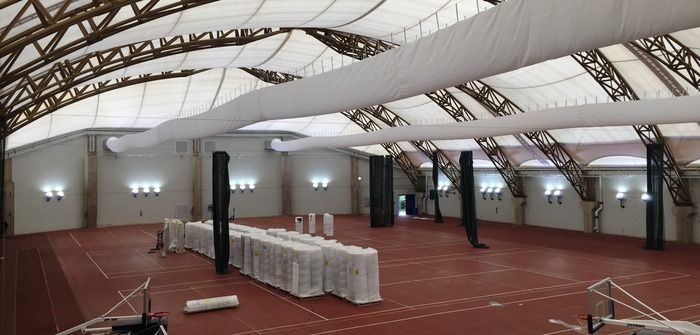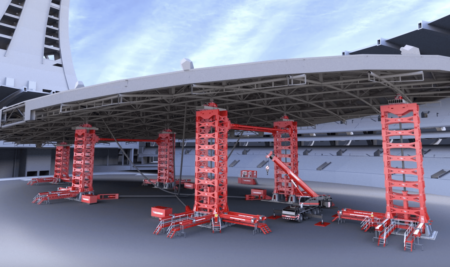Mount St Mary’s University’s John J Dillon Field House is a 30,300ft² multipurpose facility used for basketball, tennis, volleyball, track and other athletic activities at the school’s campus in Emmitsburg, Maryland, USA. Since 1987, students and community members have relied on the field house for athletic practices and indoor recreation throughout the year. With the 2015 school year underway, the facility has been re-opened after a summer-long renovation consisting of new LED lighting, HVAC equipment and flooring, and capped off with a new Tensotherm-insulated translucent membrane roofing system by Birdair.
Although the 28-year-old facility had already outlived its expectations, the university’s facilities department wanted to apply some upgrades to the field house, including the replacement of its silicon-coated fiberglass roofing system in an effort to improve its noise-reduction and heat-retention performance.
The facility is part of the university’s Knott Athletic Recreation Convocation Complex (ARCC), a 105,000ft² fitness, recreation and event center that houses a swimming pool, a full gym, a spin studio, conference rooms and more.
The new roof, which was chosen to help the field house run more efficiently, is fortified by an 8mm aerogel insulation layer that is expected to save the university over US$10,000 in annual energy costs. The facility re-opened on October 6, 2015, with a rededication ceremony, and the school’s Division I athletic teams, clubs and intramural programs are already enjoying the enhancements.
“Tensotherm is a great product for retrofitting and upgrading existing facilities,” said David Capezzuto, director of business development for Birdair. “It will help enhance the thermal and acoustical performance of the John J Dillon Field House.”
Birdair worked directly with university facilities staff to remove the existing roofing system and provide a complete design-build solution for the new roof. Birdair’s extensive in-house design, fabrication, installation and maintenance capabilities were imperative to the project’s success and timely completion.
Tensotherm is the world’s first and only translucent and insulated fabric roofing material. Its many invaluable benefits include: diffused glare-free natural daylight; enhanced temperature control, even in the most extreme environments; remarkable acoustics; and innovative sustainability.
To create Tensotherm, a thin translucent blanket, embedded with aerogel, is placed between a PTFE fiberglass membrane exterior skin and a thinner and lighter acoustic or vapor barrier interior liner. The resulting composite material is a thin, flexible and highly translucent glazing system that provides extraordinary benefits – including superior thermal insulation and dampening of acoustics, which is an obvious benefit for multipurpose venues.
Tensotherm is also surprisingly lightweight. Comprised of 95% air, aerogel is the world’s lightest solid material, making Cabot Corporation’s aerogel a perfect fit for the lightweight PTFE fiberglass fabric membrane. Together, this combination of materials delivers a composite system that is lighter than any other insulated roofing option, ideal for small/mid-size to long-span applications. Its decreased weight limits the need for heavy supporting structures, minimizing material usage and cost, and reducing energy consumption during shipping and installation.
Similar to traditional fabric architecture, which is installed in tension through principles of tensile architecture, Tensotherm’s light weight and freedom of form allows for wide-ranging design possibilities.
A Tensotherm roof and traditional single layer PTFE roof are very similar in appearance. In addition, PTFE is extremely durable and weather resistant in all climates, with projects proven to last in excess of 30 years.
November 13, 2015





